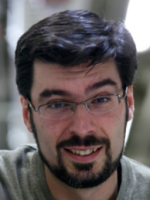 » How Will Big Pictures Emerge From a Sea of [...] Data?
» How Will Big Pictures Emerge From a Sea of [...] Data?
Luis A. N. Amaral
Professor
Northwestern University
http://amaral-lab.org/
Every year since the article "How Will Big Pictures Emerge From a Sea of Biological Data?" appeared in Science, the question becomes more compelling. We are now accumulating information about biological sequences, structures, and interactions faster than we have the power to make sense of them. For hundreds of years prior to this, practical considerations coerced biological research into reductionism. There are simply too many components in a biological system for a biologist to examine the whole picture with the tools formerly available. Over the past decade this has rapidly changed as biological information has become cheap and plentiful due to the advent of high-throughput tools, making it possible for the first time to ask questions on time and length scales that were previously intractable. The relaxation of the practical limitations on systems-level analysis has also brought a change in the philosophy of how we regard biology, moving towards a holistic method of research and interpretation.
This places systems biology in stark contrast to traditional biological research, and for good reason. In the words of Denis Noble, "Systems biology is about putting together rather than taking apart, integration rather than reduction. It starts with what we have learned from the reductionist approach; and then it goes further." This shift from reductionism is essential, for as we know from studying complex systems, the whole is greater than the sum of the parts. With this new approach we are able to explore scientific territory that has previously been untouched due to physical impossibility and philosophical differences. The complexity of the tangled web of nonlinear interactions between genes, proteins, and the environment necessitates the development of simplified models to illuminate biological functions. Merely generating networks of interactions is not enough, providing us with far too much information in a single view without emphasizing the important features of the map. When we use Google maps and look at a picture of the United States it doesn't show us every city, we would never see Evanston, Illinois being shown at that level of detail. Only large and recognizable cities are shown to help us orient the map. Once we zoom in other smaller cities and features become visible, giving us more relevant information in a manner that is usable. Simply generating networks without any type of analysis or visualization is akin to showing a map of the United States with every state, city, and town marked on it. In my talk, I will describe the advances we have made in developing new visualization methods and the challenges still remaining.
» BioProfessor Amaral, a native of Portugal, conducts and directs research that provides insight into the emergence, evolution, and stability of complex social and biological systems. His research aims to address some of the most pressing challenges facing human societies and the world's ecosystems, including the mitigation of errors in healthcare settings, the characterization of the conditions fostering innovation and creativity, or the growth limits imposed by sustainability. Recently, Amaral proposed the development of cartographic methods for the representation of complex biological networks. These methods will enable researchers to accomplish something similar to what travelers now can easily accomplish with, for example, Google Maps, that is, to glean the important information on a given system at the scale of interest to the researcher. These tools hold the promise to enable biomedical researcher to design or reengineer biological systems for therapeutic purposes. Professor Amaral has published over a hundred scientific peer-reviewed papers in leading scientific journals. Those papers have been cited in excess of seven thousand times; ten having accumulated more than 200 citations each. His research has been featured in numerous media sources, both in the US and abroad. Professor Amaral has received a CAREER award from the National Institutes of Health in 2003, was named to the 2006 class of Distinguished Young Scholars in Medical Research by the W. M. Keck Foundation, and has been selected as an Earlier Career Scientist by the Howard Hughes Medical Institute. Amaral holds a Ph.D. in physics from Boston University.




 Week-at-a-Glance
Week-at-a-Glance





















